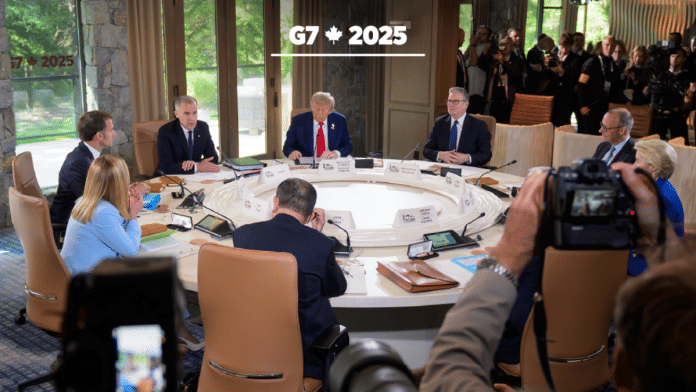New Delhi: The leaders of G7 nations have backed Israel in the ongoing conflict with Iran, labelling Tehran as the “principal source of regional instability and terror”. In a statement Tuesday, they reiterated their consistent stand that Iran “can never have a nuclear weapon”.
They acknowledged the strain the ongoing conflict can cause on the international energy market and said they “stand ready to coordinate, including with like-minded partners, to safeguard market stability”.
“We affirm that Israel has a right to defend itself. We reiterate our support for the security of Israel…Iran is the principal source of regional instability and terror. We have been consistently clear that Iran can never have a nuclear weapon,” the G7 leaders said in the statement.
They added, “We urge that the resolution of the Iranian crisis leads to a broader de-escalation of hostilities in the Middle East, including a ceasefire in Gaza. We will remain vigilant to the implications for international energy markets and stand ready to coordinate, including with like-minded partners, to safeguard market stability.”
The statement comes as the conflict between Iran and Israel continues to escalate in its fifth day Tuesday. US President Donald Trump cut short his visit to the G7 Summit in Canada and returned to Washington as the conflict heats up. The two-day summit is scheduled for 16 June and 17 June, but Trump departed following a dinner hosted by Canadian Prime Minister Mark Carney.
The G7 members are the US, the UK, France, Canada, Italy, Japan and Germany along with the European Union. Prime Minister Narendra Modi will be attending the outreach summit later Tuesday along with a number of other invited leaders including President Volodomyr Zelenskyy of Ukraine.
#G7 leaders’ statement on recent developments between Israel and Iran.
Read more: https://t.co/HlV9Fcclfw pic.twitter.com/C6vvlqMmw7
— G7 (@G7) June 17, 2025
Trump is weighing options to enter the conflict directly, according to reports, given that only the US has the weapons—the famed bunker-buster ordinance—capable of striking at Iran’s deep underground enrichment facilities.
The conflict, which began following Israel’s launch of Operation Rising Lion in the early hours of 13 June, has seen fierce military exchanges between the two West Asian nations, resulting in the death of 200 Iranians so far. Over 20 Israelis have been killed in Iran’s retaliatory strikes.
“Iran should have signed the ‘deal’ I told them to sign. What a shame, and waste of human life. Simply stated, IRAN CAN NOT HAVE A NUCLEAR WEAPON. I said it over and over again! Everyone should immediately evacuate Tehran!” Trump said in a post on his social media platform Truth Social.
Israel’s strikes aim at degrading Iran’s nuclear enrichment as well as military capabilities. The Israeli military has said that it maintains air superiority over Iran, and has struck at the Natanz nuclear enrichment facility as well as Isfahan. The International Atomic Energy Agency (IAEA) has indicated that the overground facilities and electricity supply to the Natanz plant have been damaged in Israeli strikes, while parts of Isfahan have also been hit.
Iran has indicated to the IAEA that military activity around the nuclear site in Fordow has also been seen. However, any strike against Fordow would require the US to be involved given how deep the facility is located underground.
According to reports, Trump was not keen on signing the initial draft statement on the conflict in West Asia, however, after some changes he signed onto the final statement. Israel’s military operation has killed at least 10 major security officials in Iran including the chief of staff of the armed forces Major General Mohammad Bagheri and Major General Hossein Salami, the Commander of the Islamic Revolutionary Guard Corps (IRGC).
In retaliation, Iran launched Operation True Promise 3 on the evening of 13 June, launching ballistic missiles at targets across Israel.
(Edited by Ajeet Tiwari)
Also Read: No country can stop Israel-Iran war now. For Netanyahu & Khamenei, it’s a zero-sum game






